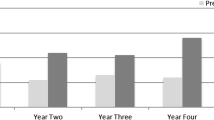Abstract
Our volume has set out to examine the dynamics of social service delivery with a principal focus on faith-based organizations. Our qualitative and comparative approach has analyzed the contours of welfare service provision across different social service domains (family , housing, addiction recovery) , provider types (faith-intensive, faith-related, secular ), and locales (Mississippi , Michigan , and Washington -Oregon ). A consistent analytical theme has also been explored throughout this volume in the form of the three C’s of social service provision. Using what we called a layered case study approach, we have been mindful of programmatic content (service delivery dynamics), organizational culture (agency mission, values , etc.), and ecological context (community environment , religious landscape, etc.).
Access this chapter
Tax calculation will be finalised at checkout
Purchases are for personal use only
Similar content being viewed by others
Notes
- 1.
Avishai (2008).
- 2.
Bartkowski and Regis (2003).
- 3.
Aron and Sharkey (2002).
- 4.
Goggin and Orth (2002).
- 5.
- 6.
- 7.
For an excellent comparison of faith-based organizations across national contexts, see Clarke and Jennings (2008).
- 8.
- 9.
Nagel (2013).
- 10.
Porter (2017).
- 11.
One of our regrets is that, despite the wealth of agency-level data we were able to collect and analyze for this volume, securing interview data from program participants in sufficient numbers to warrant sustained analysis proved to be quite difficult and was restricted largely to Chap. 6. As work on this front continues, we hope that the insights that have emerged from our extensive interactions with social service workers can be complemented by an even wider range of perspectives—aspirations and frustrations alike—from those these programs are designed to serve. For an excellent treatment of recipients of faith-based services, see Chap. 6 of Wuthnow (2004).
References
Avishai, Orit. 2008. “Doing religion” in a secular world: Women in conservative religions and the question of agency. Gender & Society 22: 409–433.
Bartkowski, John P., and Helen A. Regis. 2003. Charitable choices: Religion, race, and poverty in the post-welfare era. New York: New York University Press.
Campbell, David. 2002. Beyond Charitable Choice: The diverse service delivery approaches of local faith-related organizations. Nonprofit and Voluntary Sector Quarterly 31: 207–230.
Clarke, Gerald, and Michael Jennings (eds.). 2008. Development, civil society and faith-based organizations: Bridging the sacred and the secular. New York: Palgrave Macmillan.
Farnsley, Arthur E., III. 2007. Faith-Based Initiatives. Pp. 345–356 in The Sage Handbook of the Sociology of Religion, edited by James A. Beckford and N.J. Demerath, III. Thousand Oaks, California: Sage; Unruh and Sider 2005.
Goggin, Malcolm L., and Deborah A. Orth. 2002. How Faith-Based and Secular Organizations Tackle Housing for the Homeless. Albany, N.Y.: Rockefeller Institute of Government.
Lockhart, William H. 2005. Building Bridges and Bonds: Generating Social Capital in Secular and Faith-Based Poverty-to-Work Programs. Sociology of Religion 66: 45–60.
Monsma, Stephen V. 2004. Putting faith in partnerships: Welfare-to-work in four cities. Ann Arbor, Mich.: University of Michigan Press.
Nagel, Alexander-Kenneth. 2013. Agents, armies, allies: Semantics of public-private partnerships in US welfare reform. Journal of Religion in Europe 6: 175–200.
Porter, Tom. 2017. Deep state: How a conspiracy theory went from political fringe to mainstream. Newsweek. August 2.
Pipes, Paula F., and Helen Rose Ebaugh. 2002. Faith-Based Coalitions, Social Services, and Government Funding. Sociology of Religion 2002: 49–68.
Sager, Rebecca. 2010. Faith, politics, and power: The politics of faith-based initiatives. New York: Oxford University Press.
Unruh, Heidi Rolland, and Ronald J. Sider. 2005. Saving souls, serving society: Understanding the faith factor in church-based social ministry. New York: Oxford University Press.
Wineburg, Bob. 2007. Faith-based inefficiency: The follies of Bush’s initiative. New York: Praeger.
Wuthnow, Robert. 2004. Saving America? Faith-Based Services and the Future of Civil Society. Princeton, N.J.: Princeton University Press.
Author information
Authors and Affiliations
Corresponding author
Rights and permissions
Copyright information
© 2018 Springer International Publishing AG, part of Springer Nature
About this chapter
Cite this chapter
Bartkowski, J.P., Grettenberger, S.E. (2018). Conclusion: Promising Partners or Strange Bedfellows? Faith-Based Providers and Government Funders. In: The Arc of Faith-Based Initiatives. Springer, Cham. https://doi.org/10.1007/978-3-319-90668-3_7
Download citation
DOI: https://doi.org/10.1007/978-3-319-90668-3_7
Published:
Publisher Name: Springer, Cham
Print ISBN: 978-3-319-90667-6
Online ISBN: 978-3-319-90668-3
eBook Packages: Social SciencesSocial Sciences (R0)




